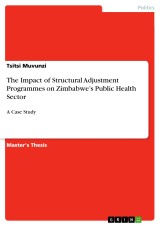Details

The Impact of Structural Adjustment Programmes on Zimbabwe's Public Health Sector
A Case Study1. Auflage
|
36,99 € |
|
| Verlag: | Grin Verlag |
| Format: | |
| Veröffentl.: | 19.04.2013 |
| ISBN/EAN: | 9783656415015 |
| Sprache: | englisch |
| Anzahl Seiten: | 125 |
Dieses eBook erhalten Sie ohne Kopierschutz.
Beschreibungen
Master's Thesis from the year 2011 in the subject Politics - Topic: Development Politics, grade: 80%, Ewha Womans University (Graduate School of International Studies), course: International Studies, language: English, abstract: ABSTRACT
Structural Adjustment Programmes (SAPs) of the IMF (IMF) and World Bank (WB) were implemented as part of aid conditionality in Africa and Latin America since the 1980s. There is a wide range of literature critical of SAPs. Several debates have focused on whether the failure of SAPs was a result of the inherent weaknesses of the IMF/ WB sponsored structural adjustment or whether it was caused by structural failures of policy implementation within the African continent. The author uses the Zimbabwean case to analyze the impact of SAPs on social service sectors, particularly the public health sector. This paper provides a case where the Zimbabwean health sector demonstrated significant progress in public health delivery, and showed prospects of further improvements before the implementation of structural adjustment between 1990 and 2000. In this thesis I show that cost recovery systems and reduced public expenditure on health led to rising costs of health services and increased inequalities in health service provision. It also resulted in the abandonment of critical public health programmes and consequently contributed to poor funding for health infrastructure, maintenance, drugs and equipments. Furthermore, retrenchments in the public health sector robbed it of critical and well qualified staff and exacerbated brain drain. SAPs were implemented amid public protests and demonstrations by the general public and organized interest groups. This is not only because they brought negative impacts on livelihoods but also because there were little consultations between the government and civil society prior to their implementation. This paper also illustrates that, to a larger extend SAPs increased women’s care burden and worsened their health situation. Household food consumption and family health needs are responsibilities bestowed upon women in Zimbabwe’s patriarchal society. Therefore, user fees and reduction of public health expenditure increased pressure on women to take care of the sick who could not afford medical fees. Furthermore, rising costs of maternal health, reduction of funds for preventive programmes and declines in public health staff had negative economic, psychological and health impacts on women.
Structural Adjustment Programmes (SAPs) of the IMF (IMF) and World Bank (WB) were implemented as part of aid conditionality in Africa and Latin America since the 1980s. There is a wide range of literature critical of SAPs. Several debates have focused on whether the failure of SAPs was a result of the inherent weaknesses of the IMF/ WB sponsored structural adjustment or whether it was caused by structural failures of policy implementation within the African continent. The author uses the Zimbabwean case to analyze the impact of SAPs on social service sectors, particularly the public health sector. This paper provides a case where the Zimbabwean health sector demonstrated significant progress in public health delivery, and showed prospects of further improvements before the implementation of structural adjustment between 1990 and 2000. In this thesis I show that cost recovery systems and reduced public expenditure on health led to rising costs of health services and increased inequalities in health service provision. It also resulted in the abandonment of critical public health programmes and consequently contributed to poor funding for health infrastructure, maintenance, drugs and equipments. Furthermore, retrenchments in the public health sector robbed it of critical and well qualified staff and exacerbated brain drain. SAPs were implemented amid public protests and demonstrations by the general public and organized interest groups. This is not only because they brought negative impacts on livelihoods but also because there were little consultations between the government and civil society prior to their implementation. This paper also illustrates that, to a larger extend SAPs increased women’s care burden and worsened their health situation. Household food consumption and family health needs are responsibilities bestowed upon women in Zimbabwe’s patriarchal society. Therefore, user fees and reduction of public health expenditure increased pressure on women to take care of the sick who could not afford medical fees. Furthermore, rising costs of maternal health, reduction of funds for preventive programmes and declines in public health staff had negative economic, psychological and health impacts on women.
Diese Produkte könnten Sie auch interessieren:

How Insights from Moral Psychology and Character Research can aid Development Cooperation

von: Jan Prothmann

13,99 €















